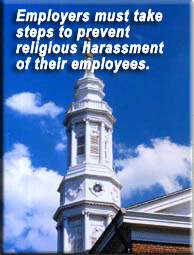|
Liability looms with religious discrimination in the workplace
It is apparent from recent activity in the Supreme Court of the United States over religious symbolism and abortion, the issue of religious freedom and practice is controversial, frequently resulting in acrimonious dispute among the various groups espousing their particular faith-based beliefs.
The issue of religion is complicated by the fact of the many  existing recognized major faiths including Christianity, Judaism, Islam, Hinduism, Buddhism, and Shintoism as well as hundreds, if not thousands, of individual sects or other faith-based organizations. As is apparent in Iraq, differences within a particular recognized religion, for example, Islam, manifest themselves in open armed conflict between members of the same faith (Shiites versus Sunnis), when the religion assumes political overtones. According to many commentators, the tragedy of September 11, 2001, is based in large part upon religious conflicts with their origins in the Crusades, a well-known religious-political conflict between Christianity and Islam occurring hundreds of years ago in the Holy Land. existing recognized major faiths including Christianity, Judaism, Islam, Hinduism, Buddhism, and Shintoism as well as hundreds, if not thousands, of individual sects or other faith-based organizations. As is apparent in Iraq, differences within a particular recognized religion, for example, Islam, manifest themselves in open armed conflict between members of the same faith (Shiites versus Sunnis), when the religion assumes political overtones. According to many commentators, the tragedy of September 11, 2001, is based in large part upon religious conflicts with their origins in the Crusades, a well-known religious-political conflict between Christianity and Islam occurring hundreds of years ago in the Holy Land.
Conflict of Beliefs and Customs
Each religion has its own established view of divinity and the after life, many of which share common origins and themes, while other religions may consider the beliefs of another faith to be frivolous, repugnant or even demonic. Likewise, many religions have developed particular customs, including:
• severe codes of conduct and extreme punishment for violations (e.g., beheadings, amputations, stoning);
• clothing;
• personal appearance;
• dietary restrictions; and
• prayer ceremony
which impact nearly every aspect of an individual believer’s daily life. When these potentially conflicting beliefs and customs find their way into the workplace, the mixture can be volatile and a source of employer liability.
September 11 Impact on Religious Discrimination
The shocking attacks occurring on September 11, 2001, heightened the awareness in this country of certain religious groups, particularly individuals who are of the Muslim faith or are perceived to be of Middle Eastern or South Asian descent. The emotional outpouring after 9/11 resulted in attacks against individuals considered to have a religious or ethnic affiliation with the purported terrorists. The EEOC responded to these actions by issuing guidelines relating to religious and related forms of discrimination. In addition, the number of employment discrimination charges rose sharply. In fact, the EEOC has filed employment discrimination harassment charges on behalf of Muslim and Arab workers, resulting in significant settlements.
Faith-Based Initiatives
Religion has further been injected into the workplace through various faith-based initiatives seeking to reestablish certain conduct within the workplace based on perceptions of “family” or traditional “moral” values, often including the debates on abortion, parental rights, sexuality, appropriate literature and language. Such activities can include employee prayer groups and other on-site activities, as well as signage and pamphlets. Depending on the viewpoint of the participant and other employees, these activities can be praiseworthy, obnoxious or potentially offensive.
Religious Discrimination
 The federal Civil Rights Act of 1964 (Title VII), as well as many state and local laws and ordinances, prohibit discrimination against employees (or potential employees) because of their religion. This prohibition includes, hiring, firing and other terms and conditions of employment (e.g., job assignment, compensation, etc.). Thus, The federal Civil Rights Act of 1964 (Title VII), as well as many state and local laws and ordinances, prohibit discrimination against employees (or potential employees) because of their religion. This prohibition includes, hiring, firing and other terms and conditions of employment (e.g., job assignment, compensation, etc.). Thus,
• Employers may not treat employees or applicants more or less favorably than other employees because of their religion.
• Employees cannot be forced to participate in a religious activity as a condition of employment.
• Employers must reasonably accommodate employees’ sincerely held religious beliefs unless doing so would impose an undue burden on the company (for example, it would probably be an undue burden to allow a full-time employee to miss 2 hours every work day for prayers, but accommodating the employee with alternative work hours might be a possibility, depending on the job).
• An employer can show undue hardship if accommodating an employee’s religious practices requires more than ordinary administrative costs, diminishes efficiency in other jobs, infringes on other employees’ job rights or benefits, impairs workplace safety, causes co-workers to carry the accommodated employee’s share of potentially hazardous or burdensome work, or if the proposed accommodation interferes with another law or regulation.
• Employers must allow employees to engage in religious expression if employees are permitted to engage in other personal expression at work, unless the religious expression would impose an undue hardship on the employer.
• Employers must take steps to prevent religious harassment of their employees.
Workplace Violence
As is apparent from centuries of conflict between various religious adherents, the presence of employees from various religious faiths with historic animosity can and has lead to various forms of negative interaction in the workplace from harassment (verbal and written) to threats of and actual physical violence. In these workplace environments, the employer must initiate effective workplace violence prevention policies and training to control a very real risk of conflict.
Religious Expression in the Workplace
At present, private employers are not prohibited from expressing their religious philosophy and views in the workplace. While this may be admirable in terms of attempting to establish a diverse culture, there can be many potential negative consequences, including:
• impact of enforcement of the religious beliefs in the workplace;
• claims by non-participating employees that they are being excluded from workplace benefits by their non-participation;
• alleged harassment by co-employees against non-participants; and
• duty to allow other (non-preferred) religious groups the opportunity to practice their faith to the same extent allowed by the employers for other faiths.
Conclusion
As our society becomes more diverse, the potential for religion (and its related preferences and prejudices) to enter the workplace with enhanced employer liabilities, is a looming risk. The employer must establish policies and train employees regarding prohibited religious discrimination in order to avoid such liability.
 Mark A. Lies, II is a labor and employment law attorney and partner with the law firm of Seyfarth Shaw, 55 E. Monroe Street (Suite 4200), Chicago, IL 60603; 312-269-8877; mlies@seyfarth.com . He specializes in occupational safety and health law and related employment law and personal injury litigation in the communications industry and is a frequent contributor to WirelessEstimator.com Mark A. Lies, II is a labor and employment law attorney and partner with the law firm of Seyfarth Shaw, 55 E. Monroe Street (Suite 4200), Chicago, IL 60603; 312-269-8877; mlies@seyfarth.com . He specializes in occupational safety and health law and related employment law and personal injury litigation in the communications industry and is a frequent contributor to WirelessEstimator.com
|